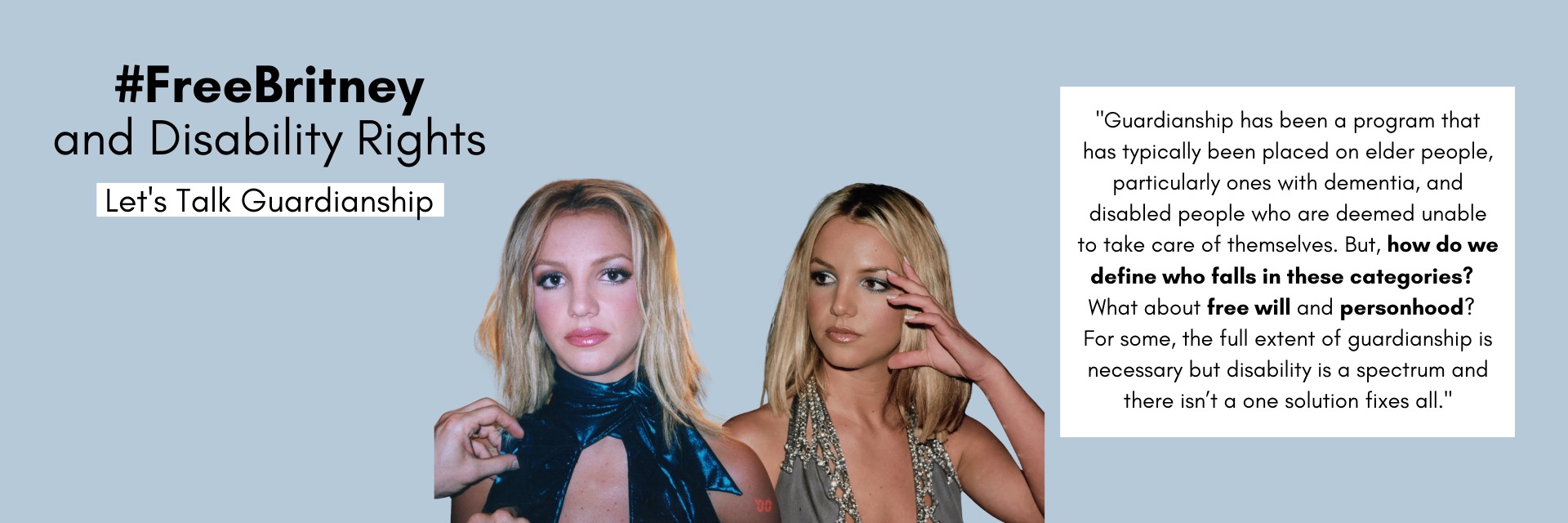
By: Bennett Hara
I’ve been seeing this new hashtag going around #freebritney. At first I was kind of confused as I was unaware that she had gone to prison, but as I looked into it more I learned that this trend was referring to the conservatorship that got placed over her due to her 2007 breakdown. After a couple incidents (remember when she shaved her head?) and locking herself and her child in a bathroom refusing to return them to her ex-husband, she went under a 5150 hold, where she was placed in a locked psychiatric facility to evaluate her mental health and assess her danger to herself and others. During this time, Britney Spears’ father sought conservatorship over her and gained guardianship rights. A conservatorship is when there is a court mandated guardian who is in charge of making decisions for people who have been found to be incapable of acting in their own best interests. Depending on the guardianship, there are various levels of decision making that are left in the hands of the guardian which can include medical, financial and even day-to-day decisions, like where to live and work. Britney has been in this situation for over 10 years but since the release of her documentary, Framing Britney Spears, the problems with her guardianship has been brought to light and the public is becoming more aware of the downfalls of this legal system.
Guardianship has been a program that has typically been placed on elder people, particularly ones with dementia, and disabled people who are deemed unable to take care of themselves. But, how do we define who falls in these categories? What about free will and personhood? For some, the full extent of guardianship is necessary but disability is a spectrum and there isn’t a one solution fixes all. Oftentimes, the courts don’t do their due diligence in understanding each individual case. The court will look at the person’s diagnosis and make the decision just based on that. According to a 1994 study by the Center for Social Gerontology, most hearings last less than 15 minutes. Do you believe someone’s free will should be able to be eliminated in 15 minutes of reviewing paperwork in court?! In some cases, the person in question isn’t even present to defend themselves and sometimes there isn’t even a hearing. The court’s decision-making in this system is flawed as it doesn’t consider the disabled person’s interests and only looks at them through the lens of able bodied people. The court's job is to determine if the person in question is acting in a normative way but relies on unreliable sources, such as having orthopedic surgeons weigh in on a person with an intellectual disability, and doesn’t take the time to fully understand the situation at hand.
Guardianship can often be forced upon disabled people and diminish their quality of life. Jenny Hatch is a woman with Down syndrome and when she got into a bicycle accident, she broke a few bones. Her mother and stepfather then sought guardianship over her. She was 28 years old at this point, working in a thrift store, living on her own and had never been under guardianship before. Her parents won and moved her away from her job and placed her in a group home that was far from her church and friends. They also started to limit Jenny’s communication and forced her to do menial work in a sheltered workshop for less than minimum wage. This new lifestyle that her parents placed upon her made her really unhappy. Luckily, Jenny was able to challenge her guardianship in court and win, getting her life back, but it’s rare for guardianship to be terminated for disabled people. I think and hope that Jenny’s parents were doing this because they thought that it was the best and safest option for their child, but parents don’t always know what’s best for their kids. Jenny built a good life that worked for her but her parents didn’t see it that way.
Guardianship is an issue that disability advocates have been challenging for sometime now but the #freebritney trend shed light on these problems to the mainstream audience. Courts oftentimes won’t consider alternatives to conservatorship and full guardianship is their default. They fail to consider other options that many disability advocates promote like supported decision making, which is a good alternative since it allows individuals to choose who they get support from and they retain the ability to have the final say. There needs to be a change in the way we frame stories of disability and self determination. Everyone needs help in making tough life decisions yet when able bodied people ask for help it isn’t assumed that they are incapable of making decisions for themselves.The system in place now seems like it’s saying that if a person has a disability and asks for support they are unable to make decisions on their own since guardianship is the only option considered. Many times the guardian will try to make it so the person they’re watching over has a “normal” life, but “normal” is being defined through the lens of able bodied people and doesn’t always work best for the person they’re caring for. Forcing normalcy inherently reemphasizes that disabled life is devalued as we are not willing to accept them for who they are but we try to fit them into our own idealized lifestyle. While some people may need the full extent of guardianship, it isn’t the right solution for all cases. We all rely on the people close to us to help us make decisions and disabled people have the right to that too without having to worry about their self-determination being taken away because they need some help.
Originally Posted: 4 May 2021

